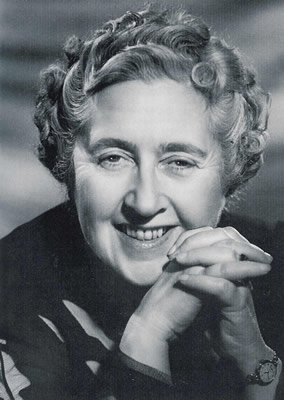Fortunately, this kind of set-up has given writers such as the afore-mentioned godmother of whodunit mysteries the perfect fodder to craft one timeless novel after the next, as was the case with The Body in the Library.
Not to dwell too much on the premise in this review, the book is centered on Miss Marple, who some would call Poirot's counterpart, an older lady whose piercing intelligence places her detective abilities far above and beyond those of the police. As the title suggests it, Miss Marple is called in by her friend to help her solve the mystery of the body of a young woman being found in their library.
The dead lady, unbeknownst to the owners of the house she was found dead in, was named Ruby Keene, was a dance hostess, and as it turned out, had no shortage of people spinning around in her whirlwind of a life.
For many people The Body in the Library is, for one reason or another, one of the more recognizable and eternal murder mysteries written by Christie, and in my opinion it is due to how flawless it is and just how well it all comes together.
There are no plot holes to speak of, and as is always the case, the mystery is unwrapped in such a way that the reader really does have the opportunity to figure out who committed the crime, if of course they are capable of it, and in this one it is certainly no small feat... but it's all fair play.
To transition the subject of the discussion to the characters themselves, Miss Marple is as lovely as she always was, and contrary to the her Belgian counterpart, she doesn't seem to know the definition of arrogance.
Her superior intellect allows her to be well ahead of the police time and time again, avoiding the pitfalls that get to them and spotting the clues that they miss, though she never makes a point to brag about it, instead preferring the refuge of humbleness and deflecting compliments about it; it's simply enjoyable to see, from time to time at least, a kind and well-mannered detective who doesn't cause trouble and still gets the job done.
The suspects in this story are also something to behold, making for a very interesting cast of varied people to choose and condemn one from, each one having his or her story to tell, his or her own uniqueness to showcase.
Christie does a fantastic job at presenting each character in a way to make them all equally-suspicious, at least to those who prefer to not to think too hard about the clues.
Naturally, being an Agatha Christie novel it isn't all dark and grim. On the contrary, it is written in a very light tone, complete with humorous situations thrown in here and there, as well as some interesting and wry observations to put together what seems like an idyllic and perfect portrait of the polite and quaint British countryside, apart from the whole murdering business of course.
And so, to cap things off, The Body in the Library perhaps stands a notch above many of Christie's other novels, being one of the ones people remember after all the years, and not without reason.
It is a perfectly-constructed mystery where every piece and detail has its place, making for a novel that ends up being a lot more than the sum of its parts.
I can do nothing but highly recommend it to those who haven't read it yet, are looking for the best of classic whodunits, or want to know what Agatha Christie is all about.
 | Agatha Christie |



Much as I enjoyed reading the book, I can't agree that there are no plot holes. The murderers conceive of a plan to give themselves an alibi. This succeeds (until Miss Marple becomes involved), but only because of the range of possible times of death given by the police surgeon, which the murderers couldn't have known in advance. If a later time limit had been stated then there would have been no alibi. Worse, if an earlier range had been stated, say 9 to 10:30 pm, then it might have been immediately obvious that the body was someone else. Also, the body was stupidly placed where it might not have been found for another day or so, which would have resulted in a much wider range for the time of death. They were also taking a big risk that a picture of the missing girl wouldn't be seen by someone who had seen the body. This was therefore not a clever plan but an incredibly stupid one, but for a while they got lucky, because it just happened to work out for them until Miss Marple got involved.
ReplyDelete